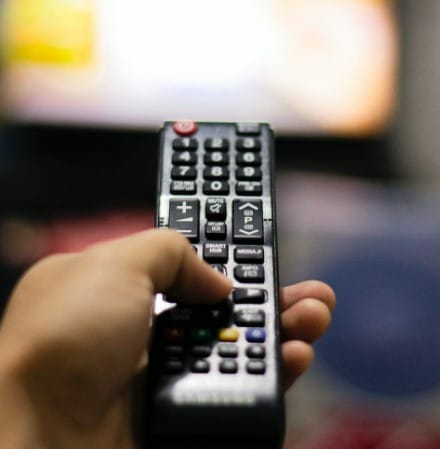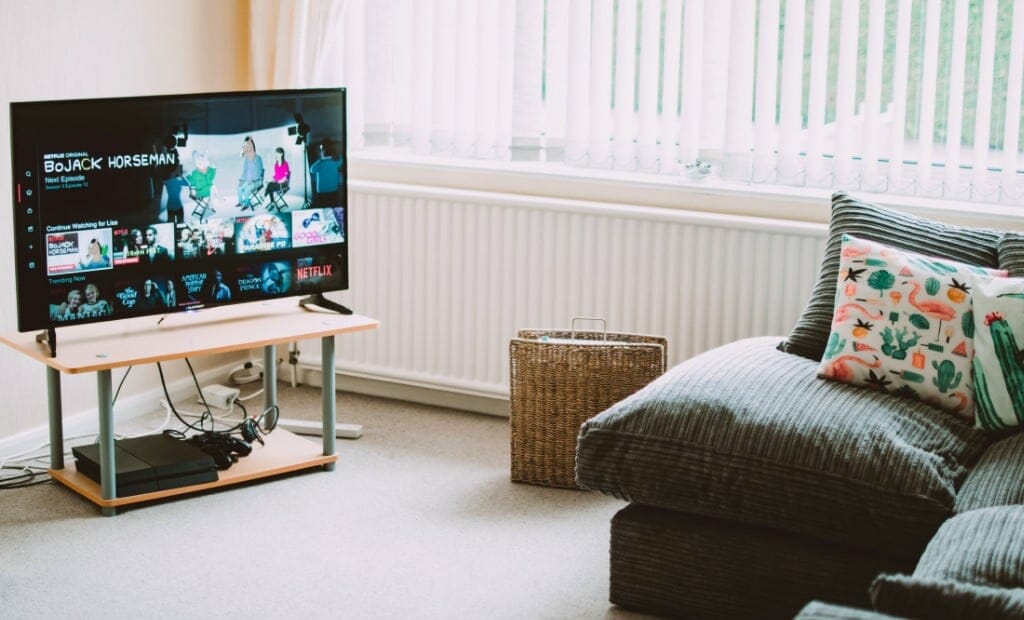Table of Contents
Can you use a TV as a monitor for a computer? Will your spare TV work, or should you buy that monitor you've been eyeing at the computer store?
As someone who has found a 20-incher monitor lacking when watching movies or playing games on the PC and have tried to hook up my computer display to old school TVs, smart TVs and so on, I understand your frustration.
Hopefully, this post should assist with your monitor vs. TV dilemma and help you decide. We also include a monitor vs TV review when it comes to gaming. In addition you can check out how to connect your monitor to a laptop here and learn how to close a laptop and still use a monitor in this guide, as well.
Key Takeaways
- You can use a TV as a monitor, to put it simply.
- If your computer's graphics card allows it, you can use a TV as a monitor.
- The variety of options might make the decision of whether to purchase a TV vs a computer monitor even more confusing. There are TV sets in various price ranges in addition to monitors for gaming and editing that vary from $400 to over $1,000.
- Using a TV as a monitor has both advantages and disadvantages. The biggest benefit is that it costs less to get a larger screen than it would if you purchased a separate monitor. The visual quality might not be as good, which is the biggest drawback.
Can You Use a TV as a Computer Monitor?
The simple answer is YES, you can use a TV as a monitor.
However, before you hook up the TV, there are 3 important things you should know:
Expensive option - If you're planning to buy a TV, which you will then use as a computer monitor, be prepared to shell out more money. This is because televisions with high pixel density and high resolution usually cost more than their monitor counterpart. |
Different sharpness - Those who are used to the screens of laptops and computers may suddenly find the picture to be blurry when using a TV. This is because monitors are designed with higher pixel density that results in sharper texts and graphics. We covered IPS monitor technology here. |
Accessories needed are different from IPS or TN monitors - If you've been using a computer monitor for years, you can't use the same cables for the TV to work as your monitor alternative. As such, you have to determine what kind of input/output ports your TV was built with. |
How to Use TV as a Computer Monitor
Using a TV as a monitor is possible, as long as your computer graphics card supports it. Here's how to use a tv as a monitor:
1. Check connection compatibility - For the TV to work, it must be able to connect to your computer (more specifically, the GPU or graphics card processing unit).
Your first bet is to look for an HDMI port (most modern TVs are built with this) on both the TV and your GPU. Try to connect them using either the male-to-male HDMI link, HDMI adapter or HDMI-to-mini-HDMI-cable. If either of these cables work, you should be able to use TV as monitor effortlessly.
2. Use alternative cables - If HDMI is not available (but a DVI port is), your solution is to purchase a DVI-to-HDMI cable, which will serve as adapter to older TVs or PCs without HDMI connections.
For computers without an HDMI, check if a DisplayPort connection is available and buy an adapter that will enable your TV to connect to your computer.

Should I Buy a Monitor or a TV for My Computer?
To buy or not to buy a TV vs computer monitor can be extra confusing because of the availability of options. You can find a monitor for gaming under $400 and a monitor for editing over $1,000, but there are also TV units within different price ranges.
Because of this, price cannot be the only consideration you should weigh.

Features to Consider Before Switching Your Monitor with a TV
Before switching your monitor for a TV, you must understand several components that would make or break your gaming or movie-watching experience. These include:
Resolution and Pixel Density
Resolution refers to the dimensions of your screen in pixels, while pixel density is the number of pixels per inch (PPI). These two details are important when you decide to use a larger TV screen as your monitor.
For example, if you're comparing a 27-inch monitor with a 40-inch TV (see LG's 4K TVs), you'd be surprised to learn they can have equal amounts of resolution, but the computer monitor has about 140ppi pixel density compared to only 40ppi of the TV.
When this is the case, the screen with lower pixel density gives images that aren't as clear as what you're used to with monitors equipped with higher pixel density.
This is normal because TVs - see best ones from Sharp - are often built with low pixels per inch density since the viewer doesn't have to watch close to the TV but from a distance. In the same vein, monitors usually have higher pixel density since the user sits closer.
Input Lag
Input lag refers to the delay that occurs between the mouse and screen. Tasks like double-clicking to open a folder, right-clicking to start a program, and so on.
Generally, you should aim at a TV with less than 20 milliseconds of input lag.
Note that this may not be a big deal if you're only planning to use the TV to watch movies or stream sports. However, if you're going to use it to play games, the input lag can be a problem.
Color Compression
When using TV as monitor, expect the picture quality to decrease a little because it compresses images and texts.
This change shouldn't really matter if you use your TV which is placed high up the wall, but if you position the TV like a typical monitor (in front of your desk), then the blurriness and lower picture quality would be more obvious.
The good news is you can adjust picture settings of most modern TVs to 4:4:4 and solve this problem. If you're still shopping for a TV, you can also look for a unit already equipped with 4:4:4 chroma subsampling.
Response Time
Response time refers to the time it takes for pixels on your screen to change colors.
Monitors for computers are designed with faster response times than TVs, but if you buy HDTVs with game mode setting, this shouldn't be an issue anymore. Once you've chosen this setting, response time of your TV should improve dramatically. For a much larger price than the monitor, though.
Refresh Rate
Refresh rate is the number of times a display "refreshes" the image per second.
The difference between monitor and TV refresh rate is often huge. Monitors can go as high as 240Hz, while TVs may only have refresh rates ranging from 60Hz to 120Hz.
Note that the higher refresh rates of your screen, the more responsive it is when it comes to using it for demanding tasks like fast-paced gaming or editing. Generally, 120Hz should be enough for most applications.
HDTV features to keep in mind
The considerations above are pretty useful if you're planning to replace a small computer monitor with a bigger TV on your desk. Simply using an HDTV would give you an eye strain or migraine real quick.
However, if you're going to be setting up the TV several feet away from your desk, or hung to the wall, then these factors shouldn't matter too much.
Why You Shouldn’t Use a TV as a PC Monitor
If you're still asking yourself if you should use your TV as a monitor, listen up to these three reasons why a TV as a PC monitor is a bad idea.
Differences in Connections
As you may already know, TVs and monitors have HDMI input that transfer the videos from your computer onto the display. HDMI is the industry standard, which is why you can find this on most gaming consoles and computer monitors.
However, not all monitors are built with HDMI. Some use DisplayPort or other connections. These differences in connections could complicate your set-up if not done right.
TVs Are Much Larger - You'll Need To Move Your Head a Lot
If you only have limited space in your room or office, getting a 40-inch TV (or bigger) won't make sense. On the other hand, if you are planning to set up a 50-inch TV as your monitor and the display is meant to be seen from across the room, then using a TV as monitor wouldn't be an issue.
Just make sure that the resolution matches your set-up. Having a big screen with 1080p resolution positioned on a desk can look blurry up-close, even if this same setup produces quality images when hung from a wall across the room.
Not only will blurry images strain your eyes, it also means you’d have to move your head a lot while viewing, gaming or editing.

Monitors Are Made For Interactivity
One of the biggest reasons NOT to choose a TV for your computer monitor is interactivity.
In most cases, people use TVs to consume movies, TV shows, documentaries, YouTube videos and other pre-recorded content. For this reason, televisions are designed as a screen just for viewing. TV brands prioritize high quality pictures, instead of improving input lag or refresh rate.
On the other hand, computer monitors are built exactly for interactivity. While the picture quality cannot always be compared to TVs, the response time, input lag, and image processing are all much faster with a monitor.
So if interactivity is important to your day-to-day requirements, whether it be video-conferencing with coworkers or playing demanding games, it is best to stick with a computer monitor.
FAQs
1. Is it bad to use a TV as a monitor?
There are pros and cons to using a TV as a monitor. The main pro is that you can get a bigger screen for less money than if you bought a separate monitor. The main con is that the image quality may not be as good. Another con is that you may not be able to use all of the features of your computer if it's hooked up to a TV. For example, on some TVs you can't change the input source without getting up from your chair.
2. Can Smart TV be used as monitor?
You can use your TV (see LG) as a monitor with the right cables and a computer. You'll need to determine which connector types are supported by your computer, but as far as the television is concerned.
3. Can we replace Monitor with TV?
You certainly can. However, before you purchase a new one or attempt to turn a computer monitor into a TV, there are a few things to consider. Ascertain that your monitor supports HDMI inputs. If you subscribe to cable or satellite television, ensure that your cable box has a DVI or HDMI output, and you may need a DVI-to-HDMI cable, so you should purchase it.
4. Why are computer monitors more expensive than TVs?
The vast majority of monitors sold today are built with lower-cost components, less memory, and simpler chipsets. Therefore, why are they more costly? Because there is less downward pressure on prices. Televisions are now sold in supermarkets, where they are stacked high and sold at a discount, especially when it comes to TVs from Vizio, Hisence, TCL and other budget-friendly alternatives.
5. What is the difference between a computer monitor and a TV?
While monitors (see FreeSync monitors) are typically smaller than standard televisions, they are not required to be. They're intended for close-up viewing and provide a more detailed image than a television. This is because monitors have a higher pixel density per inch than televisions do.



Really great post. This answered the majority of my questions. When I read this I actually opened up a word document and started taking notes haha.
Thanks for the post. I was planning to replace my monitor with a HDTV but changed my mind. I needed a bigger screen for interactive purpose.
Yes indeed TVs strain the eyes.
Especially LED TVs gosh I wish I read this before i bought this thing. Only up side is TVs come with speakers.
The other thing is that TVs never swivel if you want portrait mode whereas some monitors can…
Great content, thank you for putting it all together.
My son is vision impaired and has his laptop hooked up to his TV but he needed a desktop computer to hold the ARK game. For Christmas he got a CYBER POWER computer and we just got him a TCL TV but now we need some kind of adaptors. Any suggestions??? Thank you for your time. Annie Parke [email protected]
My sky would not work when attached to a tv. What do I do